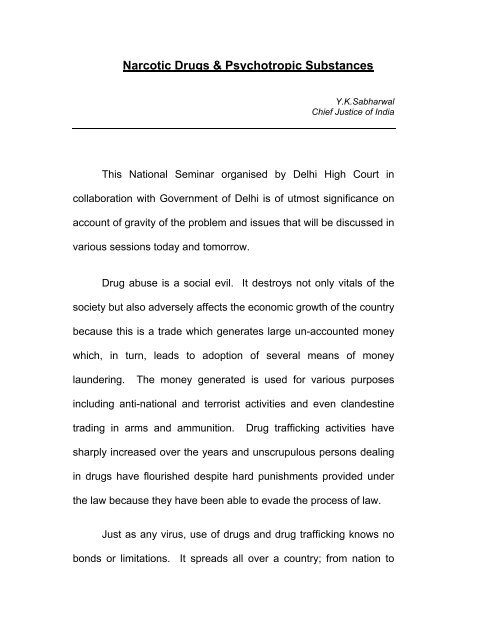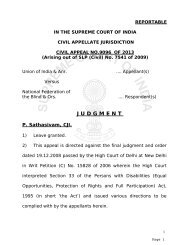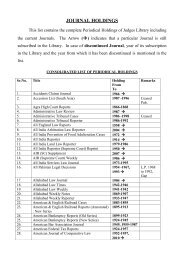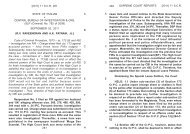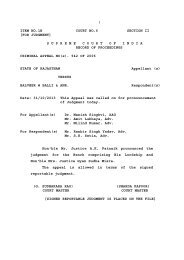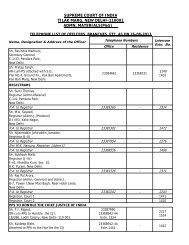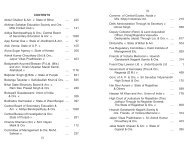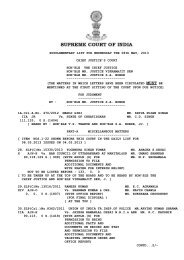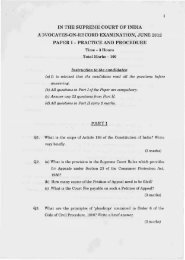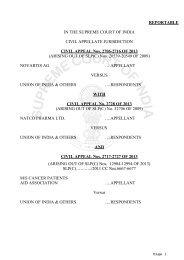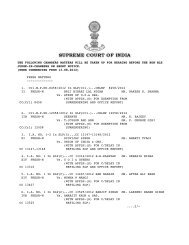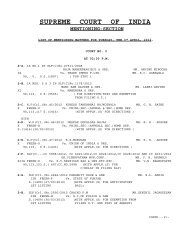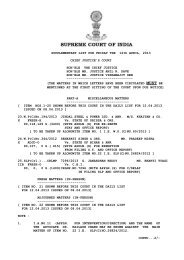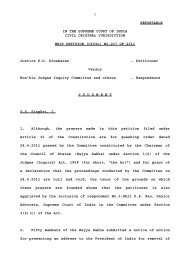Narcotic Drugs & Psychotropic Substances - Supreme Court of India
Narcotic Drugs & Psychotropic Substances - Supreme Court of India
Narcotic Drugs & Psychotropic Substances - Supreme Court of India
You also want an ePaper? Increase the reach of your titles
YUMPU automatically turns print PDFs into web optimized ePapers that Google loves.
<strong>Narcotic</strong> <strong>Drugs</strong> & <strong>Psychotropic</strong> <strong>Substances</strong><br />
Y.K.Sabharwal<br />
Chief Justice <strong>of</strong> <strong>India</strong><br />
This National Seminar organised by Delhi High <strong>Court</strong> in<br />
collaboration with Government <strong>of</strong> Delhi is <strong>of</strong> utmost significance on<br />
account <strong>of</strong> gravity <strong>of</strong> the problem and issues that will be discussed in<br />
various sessions today and tomorrow.<br />
Drug abuse is a social evil. It destroys not only vitals <strong>of</strong> the<br />
society but also adversely affects the economic growth <strong>of</strong> the country<br />
because this is a trade which generates large un-accounted money<br />
which, in turn, leads to adoption <strong>of</strong> several means <strong>of</strong> money<br />
laundering. The money generated is used for various purposes<br />
including anti-national and terrorist activities and even clandestine<br />
trading in arms and ammunition. Drug trafficking activities have<br />
sharply increased over the years and unscrupulous persons dealing<br />
in drugs have flourished despite hard punishments provided under<br />
the law because they have been able to evade the process <strong>of</strong> law.<br />
Just as any virus, use <strong>of</strong> drugs and drug trafficking knows no<br />
bonds or limitations. It spreads all over a country; from nation to
nation; to the entire globe infecting every civilized society irrespective<br />
<strong>of</strong> caste, creed, culture and the geographical location.<br />
Looking back at time, many <strong>of</strong> you may recollect that the edict<br />
<strong>of</strong> the Chinese Government in 1800 AD prohibiting import <strong>of</strong> opium<br />
as it constituted a threat to the health <strong>of</strong> the Chinese people resulted<br />
in the infamous Opium War in the name <strong>of</strong> right <strong>of</strong> free trade.<br />
European powers organised massive smuggling <strong>of</strong> the substance<br />
into China which was resisted by the Chinese resulting in the Opium<br />
War.<br />
As early as in 1917, Mahatma Gandhi while addressing the All<br />
<strong>India</strong> Social Service Conference in Calcutta, had said :<br />
“The cocaine habit was sapping the nation’s<br />
manhood, and that like the drink habit, it<br />
was on the increase in its effect more<br />
deadly than drink.”<br />
Unfortunately, the kingpins and the carriers <strong>of</strong> these drugs at<br />
the international and national level are concerned with only large<br />
undue financial gains and not with massive ill effects <strong>of</strong> use <strong>of</strong> drugs<br />
on society. In recent times, there has been significant development<br />
<strong>of</strong> the communication systems and means <strong>of</strong> transportation. This<br />
has also led to considerable increase in <strong>Narcotic</strong>s drug trafficking.<br />
2
The drug traffickers have been able to flourish despite stringent<br />
punishments provided under the ‘<strong>Narcotic</strong> <strong>Drugs</strong> & <strong>Psychotropic</strong><br />
<strong>Substances</strong> Act’. They are able to evade the process <strong>of</strong> law and<br />
cause great harm to the social and economic growth <strong>of</strong> the country<br />
and particularly the young generation. This resulted in seriously<br />
hampering the socio-economic growth and multi-dimensional<br />
development <strong>of</strong> the country. The punishment for drug trafficking<br />
became more and more stringent by the passage <strong>of</strong> time, but it has<br />
not been able to provide real solution to the basic problem.<br />
Today, world opinion and effort is united in fighting illicit<br />
production, trade and trafficking in drugs as the view is unanimous,<br />
that its effects are disastrous.<br />
In recognition <strong>of</strong> the need to globally check the menace and<br />
for international cooperation for investigation, chasing the <strong>of</strong>fenders,<br />
prevention and punishment, countries across the globe have joined<br />
hands and subscribed to conventions and conclaves convened<br />
under the aegis <strong>of</strong> the United Nations. <strong>India</strong> is also a party to the<br />
United Nations Single Convention on <strong>Narcotic</strong> <strong>Drugs</strong>, 1961 and the<br />
U.N. Protocol, 1972 amending the Single Convention and the U.N.<br />
Convention on <strong>Psychotropic</strong> <strong>Substances</strong>, 1971.<br />
3
The United Nations Convention against illicit trafficking in<br />
<strong>Narcotic</strong> <strong>Drugs</strong> & <strong>Psychotropic</strong> <strong>Substances</strong> which was held in<br />
Vienna, Austria in 1988 was perhaps one <strong>of</strong> the first international<br />
effort to take action against the illegal proceeds <strong>of</strong> drug trafficking<br />
throughout the comity <strong>of</strong> nations and manifested the desirability <strong>of</strong><br />
mutual legal assistance between Member States to deal with the<br />
menace so as to provide for confiscation <strong>of</strong> the moneys and for<br />
extradition <strong>of</strong> the <strong>of</strong>fenders. The Government <strong>of</strong> <strong>India</strong> has ratified<br />
the Convention.<br />
<strong>India</strong> has long recognised the problems <strong>of</strong> drug trafficking and<br />
abuse. The Opium Act <strong>of</strong> 1857, and <strong>of</strong> 1878 and the Dangerous<br />
<strong>Drugs</strong> Act, 1930 manifest the same. As a result <strong>of</strong> experience<br />
gained on account <strong>of</strong> <strong>India</strong>’s participation in various international<br />
conventions and realising gravity <strong>of</strong> the problem and the need to<br />
enact laws in tune with times, the <strong>Narcotic</strong> <strong>Drugs</strong> and <strong>Psychotropic</strong><br />
<strong>Substances</strong> Act <strong>of</strong> 1985 was passed by <strong>India</strong>n Parliament as a<br />
comprehensive legislation on narcotics, providing for stringent and<br />
long term prison sentences and heavy fines for <strong>of</strong>fenders. Offender<br />
under this Act includes the cultivator, supplier, seller as well as the<br />
drug consumer. Bail provisions were made very stringent. The<br />
minimum sentence is ten years. The amended <strong>Drugs</strong> and<br />
4
Cosmetics Act and Rules also provide for deterrent punishment and<br />
stringent control over manufacture, sale, distribution <strong>of</strong> psychotropic<br />
substances. Despite these measures, the crime is on rise.<br />
The criticism levelled against NDPS Act is that it treats the<br />
drug user and trafficker on par. The Government has fixed the<br />
quantity possessed for personal use as an <strong>of</strong>fence and provided a<br />
punishment for possession <strong>of</strong> quantities beyond such limits. One <strong>of</strong><br />
the criticism to this provision brought by way <strong>of</strong> amendment is that<br />
the quantity fixed is so small that it may not suffice for even a single<br />
use and that such provisions make it difficult for drug addicts to<br />
openly seek medical help and rehabilitation. It is also said that one<br />
<strong>of</strong> the cause <strong>of</strong> low conviction rate is the steep minimum sentence<br />
under the Act. How far these are relevant to ultimately check the<br />
problem <strong>of</strong> Drug Trafficking is for experts to examine.<br />
Stringent laws and severe punishments have been able to<br />
control the menace to some extent but still it is one <strong>of</strong> the most<br />
pertinent threats in the progress <strong>of</strong> any developing country. Do we<br />
need comprehensive legislative changes or is there need <strong>of</strong><br />
implementation <strong>of</strong> existing laws with greater precision and concerted<br />
effort by all concerned to resolve this issue? Laxity or pathetic<br />
attitude from any quarter in dealing with this issue is bound to prove<br />
5
disastrous for the society. All departments <strong>of</strong> the State are expected<br />
to work in unison and with utmost coordination to give an impressive<br />
display <strong>of</strong> the will to control, if not, completely eliminate this evil from<br />
the society.<br />
Before I make a brief mention <strong>of</strong> some data, let me broadly<br />
state the issue according to my perception. The persons involved in<br />
drug cases, primarily fall in four categories. First category <strong>of</strong> persons<br />
are those who produce these drugs; second are the kingpin who<br />
procure from the producers and deal in trade <strong>of</strong> drugs at a large<br />
scale; third are the carriers; and in the fourth would fall the<br />
consumers, namely drug addicts.<br />
Experts, I am confident, would consider whether all deserve to<br />
be similarly treated or differently. Take the example <strong>of</strong> carriers. For<br />
tackling the problem, should carriers deserve to be similarly treated<br />
as those falling in first and second category? Take also the example<br />
<strong>of</strong> drug addicts. Do they not need different treatment? Is it not a<br />
disease as far as they are concerned? Do they not deserve to be<br />
treated with love and compassion as a part <strong>of</strong> treatment <strong>of</strong> their<br />
ailment? These are some <strong>of</strong> the questions which I have posed on<br />
which the experts in this Seminar may focus their attention. Let us<br />
now see some facts and figures.<br />
6
In a national survey conducted by the Ministry <strong>of</strong> Social<br />
Justice and Environment and the United Nations Office <strong>of</strong> <strong>Drugs</strong> and<br />
Crimes, it was stated that abuse <strong>of</strong> different drugs is prevalent in<br />
different states <strong>of</strong> <strong>India</strong>. Rajasthan, has the highest proportion <strong>of</strong><br />
opium users (76.7%), followed by Haryana (58.0%). So far as<br />
heroin is concerned, 43.9% <strong>of</strong> its users are found in Uttar Pradesh<br />
while Orissa and Himachal Pradesh, at 43.9% and 37.3%<br />
respectively top in alcohol consumption. This indicates not only the<br />
dimension and diversity <strong>of</strong> the social problem that is facing our<br />
country, but also that the problem does not relate only to<br />
investigation and law in relation to drug abuse and drug-related<br />
crimes.<br />
The statistics released by the <strong>Narcotic</strong> Bureau also indicate<br />
the magnitude <strong>of</strong> the problem facing our nation. Let us see last ten<br />
years track record. From the year 1996-2006, amongst others<br />
21895 kgs <strong>of</strong> Opium, 855667 kgs <strong>of</strong> Ganja, 48278 kgs <strong>of</strong> hashish<br />
and 10147 kgs <strong>of</strong> heroin have been seized by various enforcing<br />
agencies. In the cases arising from these seizures, a total <strong>of</strong> 142337<br />
persons were involved including the foreigners. Out <strong>of</strong> these, 38030<br />
persons stand convicted for <strong>of</strong>fences while 44656 persons have<br />
7
een acquitted. The rate <strong>of</strong> acquittal has, varied from 27.7% to<br />
59.1% annually during this period.<br />
In its annual press conference, the Central Jail, Tihar,<br />
indicated that amongst the undertrials and convicts (both male and<br />
female) arrested under the NDPS Act, there are 10.70 % male<br />
undertrials and 5.37% male convicts and 16.12% female undertrials<br />
and 13.28% female convicts. There are nearly 340 NGOs run or<br />
aided by the Ministry <strong>of</strong> Social Justice and Empowerment,<br />
Government <strong>of</strong> <strong>India</strong>, to take reformative and remedial steps.<br />
Increase in de-addiction centres is an encouraging step taken by the<br />
concerned authorities.<br />
The <strong>Narcotic</strong>s Control Bureau was set up in May 1986 as a<br />
primary enforcement agency to deal exclusively with drugs. This<br />
high powered body which is controlled by a Director General has<br />
direct liaison with the United Nations <strong>Narcotic</strong>s Control Bureau and<br />
other international agencies working against drug trafficking. A<br />
number <strong>of</strong> the other enforcement agencies have been provided<br />
effective support with the <strong>Narcotic</strong>s Control Bureau acting as a nodel<br />
agency to enforce the law which includes the central excise,<br />
customs, border security force, CBI, Directorate <strong>of</strong> Revenue<br />
Intelligence and Food and Drug Control <strong>of</strong>ficers.<br />
8
For the first time in the history <strong>of</strong> the country, all concerned<br />
that is the prosecuting agencies, the legislature, the judiciary,<br />
scientists, eminent persons from various walks <strong>of</strong> life as well as<br />
students from various schools have been brought together to<br />
participate in this national level Seminar-cum-Workshop. Their<br />
varied experiences and knowledge would form a special thought<br />
process for evolving a system to implement programmes which are<br />
in the interest <strong>of</strong> administration <strong>of</strong> criminal justice and would serve a<br />
public purpose <strong>of</strong> high order. When crime goes unpunished, the<br />
criminal is encouraged while the society suffers. The criminal justice<br />
delivery system is already under immense pressure and needs<br />
better support. The criminal and the victim both need succour,<br />
rehabilitation and support. The statistical data furnished by different<br />
authorities suggests that the various limbs <strong>of</strong> the State<br />
administration involved in this field, have to show much better co-<br />
ordination; the investigation has to be scientific and techniques need<br />
large scale improvements. Witnesses turn hostile during trial and<br />
lack <strong>of</strong> proper application <strong>of</strong> law by concerned authorities are<br />
amongst others the few causes for high rate <strong>of</strong> acquittals.<br />
The situation needs remedial measures at once so that rule <strong>of</strong><br />
law and effectiveness <strong>of</strong> the criminal justice delivery system are not<br />
9
only maintained but improved. The rate <strong>of</strong> acquittals is a matter <strong>of</strong><br />
great concern as it elucidates the gap between the investigation and<br />
the law. As an illustration, take position in Delhi. There are six<br />
courts <strong>of</strong> Session Judges dealing with the cases under the NDPS<br />
Act. During the period August 2003 to 2005, in 1938 cases challans<br />
were filed, out <strong>of</strong> which 875 have been disposed <strong>of</strong>. Out <strong>of</strong> these,<br />
there were 479 convictions, while 391 cases ended in acquittal and<br />
in 12 cases the accused persons were discharged. This itself shows<br />
that we need to take multi-dimensional steps to improve the quality<br />
<strong>of</strong> investigation as well as increase effectiveness <strong>of</strong> criminal justice<br />
delivery system. It also underlines the fact that justice can be<br />
delivered only when there is total support by an effective and<br />
efficient investigation and administration.<br />
The topics for discussion, on this Workshop-cum-Training<br />
Programme provide provocative mental exercises to discernly find a<br />
solution to this cataclysm. Every limb <strong>of</strong> the State administration has<br />
to play a definite and pragmatic role to achieve the object underlying<br />
the provisions <strong>of</strong> the NDPS Act and the social cause behind it.<br />
Functional and administrative improvements are called for in every<br />
sphere and at every stage so as to avoid unnecessary harm to the<br />
society at large. Drug trafficking, trading and its use, affects the<br />
10
economic policies <strong>of</strong> the State, corrupts the systems and destroys<br />
the future <strong>of</strong> the country. More clearly, defining the powers, role and<br />
the response required by and from a particular agency <strong>of</strong> the State<br />
would be another aspect to be considered by the investigation and<br />
scientific, experts and legal luminaries attending this programme.<br />
They should define with greater clarity the drug related legislative<br />
framework within which police or other agencies should optimally<br />
operate and define the levels <strong>of</strong> discretion, they ought to exercise<br />
within that framework. No single agency should be held responsible<br />
for unenforceable legislation or not exercising discretion within the<br />
prescribed framework, where it is not clearly indicated.<br />
To emphasize the need for providing a panacea to this<br />
problem while preventing retrogression <strong>of</strong> socio-economic values all<br />
over the world, I would refer to the observations <strong>of</strong> the <strong>Supreme</strong><br />
<strong>Court</strong> <strong>of</strong> Canada in the case <strong>of</strong> United States <strong>of</strong> America versus<br />
Cotroni :-<br />
“The investigation, prosecution and<br />
suppression <strong>of</strong> crime for the protection <strong>of</strong><br />
the citizen and the maintenance <strong>of</strong> peace<br />
and public order is an important goal <strong>of</strong> all<br />
organized societies. The pursuit <strong>of</strong> that<br />
goal cannot realistically be confined within<br />
11
national boundaries. That has long been<br />
the case, but it is increasingly evident<br />
today. (1989) 48 C.C.C. (3 rd ). 193 at 215).”<br />
Whatever be the origin or source <strong>of</strong> drug abuse, this deadly<br />
practice gravely affects the most productive and dynamic section <strong>of</strong><br />
our society, that is the age group between 15-40. There is, thus,<br />
inestimable loss to the social, economic and cultural life <strong>of</strong> the<br />
people and to wealth <strong>of</strong> the nation. Drug abuse has been identified<br />
as playing a significant part in the spread <strong>of</strong> diseases like AIDS.<br />
Drug problems are part <strong>of</strong> the larger problems <strong>of</strong> disease,<br />
poverty, unemployment, violence, economic disparity and styles <strong>of</strong><br />
living. The consequential creation <strong>of</strong> a growing population <strong>of</strong> victims<br />
<strong>of</strong> drug abuse and addiction who have to be not only help wean <strong>of</strong>f<br />
this habit but also brought back into mainstream living.<br />
It is heartening to note that various wings <strong>of</strong> the State<br />
administration from all over the country are participating in this<br />
seminar not to find fault with the others but to participate in this<br />
Seminar-cum-Workshop programme as a joint venture to outline<br />
corrective measures, perfect investigative mechanisms and aim<br />
towards expeditious and effective judicial pronouncements to ensure<br />
punishment to the guilty and prevention and control <strong>of</strong> drug<br />
12
trafficking. This would certainly help in achieving the object <strong>of</strong> the<br />
common goal <strong>of</strong> such national importance and public welfare. A<br />
note <strong>of</strong> caution, that while guilty has to be punished and stringent<br />
punishment inflicted but at the same time it is equally necessary to<br />
ensure that innocent are not involved by taking undue advantage <strong>of</strong><br />
stringent provisions <strong>of</strong> the Act.<br />
Healthy discussion, brain storming and sharing <strong>of</strong> ideas brings<br />
out clearly errors and weaknesses which hitherto may be hidden and<br />
obscure to the light <strong>of</strong> reason and render them clearer for<br />
ameliorating or improving or substituting any existing system.<br />
Inconvenient points <strong>of</strong> view receive appreciation in their correct<br />
perspective, lead to a path <strong>of</strong> solution, which normally may sound<br />
impossible to achieve. One <strong>of</strong> the cardinal principles <strong>of</strong> any civilized<br />
jurisprudence is to remove the cause <strong>of</strong> litigation and eliminate<br />
heinous crimes from society. To find the cause <strong>of</strong> a cause which<br />
causes the things caused is the responsibility <strong>of</strong> all concerned<br />
without exception. A variety <strong>of</strong> reasons could be stated for the<br />
repeated errors at different levels, but to really get to the root <strong>of</strong> the<br />
defects in the system and society should be the basic aim <strong>of</strong> this<br />
programme so as to control the production, supply, trafficking and<br />
consumption <strong>of</strong> this noxious substance. Towards achievement <strong>of</strong><br />
13
such end, we may listen to critics because <strong>of</strong>ten they are good<br />
source <strong>of</strong> information for what you have to do differently.<br />
Democracy essentially includes social democracy which<br />
means a way <strong>of</strong> life with monumental liberty, equality and fraternity<br />
as the principles <strong>of</strong> life. Such liberty cannot be divorced from<br />
economic democracy. The widespread evil <strong>of</strong> drug trafficking not<br />
only creates shackles on these principles but leads to a complete<br />
impediment in the progress <strong>of</strong> the country in various fields. The<br />
expression ‘reason to believe’ in the context <strong>of</strong> a provision <strong>of</strong> NDPS<br />
Act has been a matter <strong>of</strong> great legal controversy. It does not mean a<br />
purely subjective satisfaction on the part <strong>of</strong> the concerned <strong>of</strong>ficer<br />
while he has to search a suspect carrying drugs, it has to be a belief<br />
in good faith and not on a mere pretence. The provisions <strong>of</strong><br />
Sections 42 and 50 have been subjected to the principle <strong>of</strong> statutory<br />
interpretation by various decisions <strong>of</strong> the <strong>Supreme</strong> <strong>Court</strong> including<br />
that <strong>of</strong> a Constitution Bench in the case <strong>of</strong> State <strong>of</strong> Punjab v.<br />
Baldev Singh [(1999) 6 SCC 172]. Some <strong>of</strong> the difficulties in<br />
investigation and prosecution <strong>of</strong> such <strong>of</strong>fences and conflicts in<br />
judicial pronouncements were taken note <strong>of</strong> by the then Chief<br />
Justice <strong>of</strong> <strong>India</strong> while resolving issues and speaking for the<br />
Constitution Bench <strong>of</strong> the <strong>Supreme</strong> <strong>Court</strong>.<br />
14
Before parting, I may say that benefits <strong>of</strong> such seminar even<br />
find manifestation in the figures which were received from the State<br />
<strong>of</strong> Haryana where the conviction rate accelerated from 14% in the<br />
year 1999 to 59% in the year 2005 after implementation <strong>of</strong> some <strong>of</strong><br />
the suggestions made and some legislative amendments. This is a<br />
live example as to what can be achieved merely by more efficient<br />
implementation <strong>of</strong> the existing laws and streamlining the<br />
investigative procedures, and the usefulness <strong>of</strong> suggestions which<br />
emerge from collective wisdom <strong>of</strong> such gathering.<br />
As a Head <strong>of</strong> the <strong>India</strong>n Judiciary, I assure this August<br />
gathering <strong>of</strong> full cooperation from the judicial system <strong>of</strong> the country in<br />
tackling this problem. I have no doubt that your deliberations shall<br />
be <strong>of</strong> salutary significance and <strong>of</strong> utmost utility to the cause <strong>of</strong><br />
control and prevention, punishment and rehabilitation in relation to<br />
the <strong>of</strong>fences under this Act and for achieving the social goal <strong>of</strong> drug-<br />
abuse free society. I wish you all the best in your endeavour.<br />
********<br />
15


